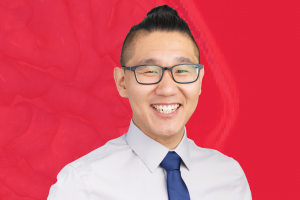A Georgetown University graduate received the 2024 National Institute of Health (NIH) director’s early independence award the university announced Oct. 10.
The award, established in 2011, supports promising newly graduated scientists, allowing them to bypass the traditional postdoctoral training to start careers in independent research. Georgetown psychology graduate Shawn Rhoads (GRD ’22) is one of 12 recipients of the 2024 award, which grants him $1.25 million to conduct a project researching the neural and computational basis of social disconnection and loneliness.

Rhoads, who is currently a postdoctoral research fellow at the Icahn School of Medicine at Mount Sinai, said he will use the funding to conduct an independent five-year research project in his laboratory, which is based in the Center for Computational Psychiatry at Mount Sinai.
“I have been examining how social behaviors and interactions (in other words, how we connect with others) impact our own mental health and well-being,” Rhoads wrote to The Hoya. “My laboratory aims to unpack the factors that impair or improve the well-being of self and others across multiple levels of analysis.”
Rhoads’ research lies at the intersection of neuroscience, social science and computational science and he uses a computational approach that seeks to understand what social factors cause and inhibit human well-being.
Rhoads said his research employs a variety of different types of analysis.
“I will use a combination of methods — such as computational modeling, neuroimaging, and intracranial recordings — to characterize individual variability in perception, learning, and decision-making across interpersonal experiences,” Rhoads wrote.
Rhoads said his interest in the science of social interaction dates back to his time as a doctoral student at Georgetown from 2017 to 2022, when he studied social cognition and welfare.
“My research examined how people learn to make choices that impact both themselves and others, which could be through mutually beneficial or harmful outcomes, or through more complex altruistic behaviors (benefiting others at a personal cost) or instrumental harm (gaining personal benefits at others’ expense),” Rhoads wrote. “My dissertation focused on this aspect of social cognition, along with topics pertaining to how we understand other’s internal states (such as their emotions or beliefs) and how we value their welfare (for example, via altruistic choices), and how the brain supports these.”
Abigail Marsh, a professor in Georgetown’s psychology department and interdisciplinary program in neuroscience who served as Rhoads’ mentor, said Rhoads’ impressive work makes him deserving of the NIH award.
“He’s just an amazing combination of a scientist, whose technical skills and knowledge make him unusually innovative,” Marsh told The Hoya. “He is doing very high-level, computational neuroscience that is helping us answer new questions about learning and interactions and the social demands that are related to pressing social problems, like loneliness, prosocial behavior and altruism.”
Marsh said she is excited about Rhoads’ current NIH-funded research project, as it studies human well-being in relation to social connection.
“He’s done some really fascinating computational neuroscience studies looking at the brain variables that are associated with feeling socially connected to people and wanting to help people,” Marsh said.
Rachel Barr, a professor in and chair of Georgetown’s psychology department who taught Rhoads in a core seminar class while he was at Georgetown, said Rhoads’ rigorous work as a graduate student deserves the NIH Award.
“Dr. Rhoads is highly deserving of this prestigious early career award,” Barr wrote to The Hoya. “As a graduate student, he was always at the cutting edge of science, he asked excellent questions, and he has a clear and precise oral and written communication style.”
Rhoads said he wants his research to make a broader social impact in policy ramifications, shaping policies that are better equipped to combat loneliness and promote social interaction.
“My overarching aim is to translate any insights for application in healthcare and policy,” Rhoads wrote.